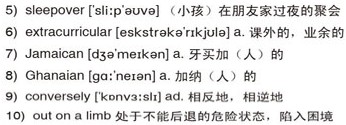I'm using the term “Chinese mother” loosely. I recently met a supersuccessful white guy from South Dakota (you've seen him on television), and after comparing notes we decided that his working-class father had definitely been a Chinese mother. I know some Korean, Indian, 7)Jamaican, Irish, and 8)Ghanaian parents who qualify too. 9)Conversely, I know some mothers of Chinese heritage, almost always born in the West, who are not Chinese mothers, by choice or otherwise.
在书中,我宽泛地使用“中国妈妈”这个说法。最近,我遇到一位超级成功的美国白人小伙子,他来自南达科他州(美国读者应该在电视上见过他)。在比较了我们各自家庭的“清规戒律”后,我们发现,他的蓝领爸爸俨然就是一位“中国妈妈”。我还认识一些来自韩国、印度、牙买加、爱尔兰和加纳的父母,他们也完全拥有中国父母的特质。相反,我所认识的一些出生在西方国家但有着中国血统的妈妈,她们自觉或不自觉地,反而没有成为真正的“中国妈妈”。
I'm also using the term “Western parents” loosely. Western parents come in all varieties. In fact, I'll go 10)out on a limb and say that Westerners are far more diverse in their parenting styles than the Chinese. Some Western parents are strict; others are lax. There are same-sex parents, 11)Orthodox Jewish parents, single parents, ex-hippie parents, investment banker parents, and military parents. None of these “Western” parents necessarily 12)see eye to eye, so when I use the term “Western parents,” of course I'm not referring to all Western parents—just as “Chinese mother” doesn't refer to all Chinese mothers.
我也宽泛地使用“西方父母”这个说法。西方的父母林林总总、风格各异。事实上,我愿意冒天下之大不韪说这话:与中国父母相比,西方父母教育孩子的方式比中国父母更为多样化:有的严厉,有的宽松。西方父母的类型也五花八门:同性的,信奉正统犹太教的、单亲的、前嬉皮士的、在投资银行工作的和出身于军人家庭的……显然,没有一对西方父母对教育孩子拥有一致的看法。因此,当我使用“西方父母”这个称谓时,并不是指所有的西方父母,正如我提到的“中国妈妈”,也不能代表每一位中国母亲。
All the same, even when Western parents think they're being strict, they usually don't come close to being Chinese mothers. For example, my Western friends who consider themselves strict make their children practice their instruments thirty minutes every day. An hour at most. For a Chinese mother, the first hour is the easy part. It's hours two and three that get tough.
同样地,尽管西方父母认为他们对孩子的要求已足够严格,但其严格的尺度通常很难接近于中国妈妈的标准。例如,我的西方朋友们要求孩子弹奏乐器,每天半小时,最多一小时,他们认为这已经严厉有加了。然而,对中国妈妈来说,孩子们进行弹奏的第一个小时,只是轻松愉快的热身,而不停地弹上两三个小时,那才算得上是“练习”,才具有一定的难度。
Despite our 13)squeamishness about cultural stereotypes, there are tons of studies out there showing marked and 14)quantifiable differences between Chinese and Westerners when it comes to parenting. In one study of 50 Western American mothers and 48 Chinese immigrant mothers, almost 70% of the Western mothers said either that “stressing academic success is not good for children” or that “parents need to 15)foster the idea that learning is fun.” By contrast, roughly 0% of the Chinese mothers felt the same way. Instead, the vast majority of the Chinese mothers said that they believe their children can be “the best” students, that “academic achievement reflects successful parenting,” and that if children did not excel at school then there was “a problem” and parents “were not doing their job.”
尽管对文化差异的见解已是老生常谈,但在养育孩子方面,的确有无数研究有理有据地证实了中西文化之间存在着明显差异。一份对50位西方妈妈和48位移居美国的中国妈妈的调查研究显示,70%的西方妈妈认为,“在学习上对孩子施加压力的做法是有害的”,“父母应本着让学习变得生动有趣的思路来培养孩子”。与此相反的是,基本没有哪位中国妈妈赞成这样的想法。大多数的中国妈妈确信她们的孩子可以在学校里出类拔萃,她们认为“孩子在学业上的成就反映了家长教子有方”;如果孩子不能在学校里脱颖而出,那就“有问题”了,就说明做父母的“严重失职”。




